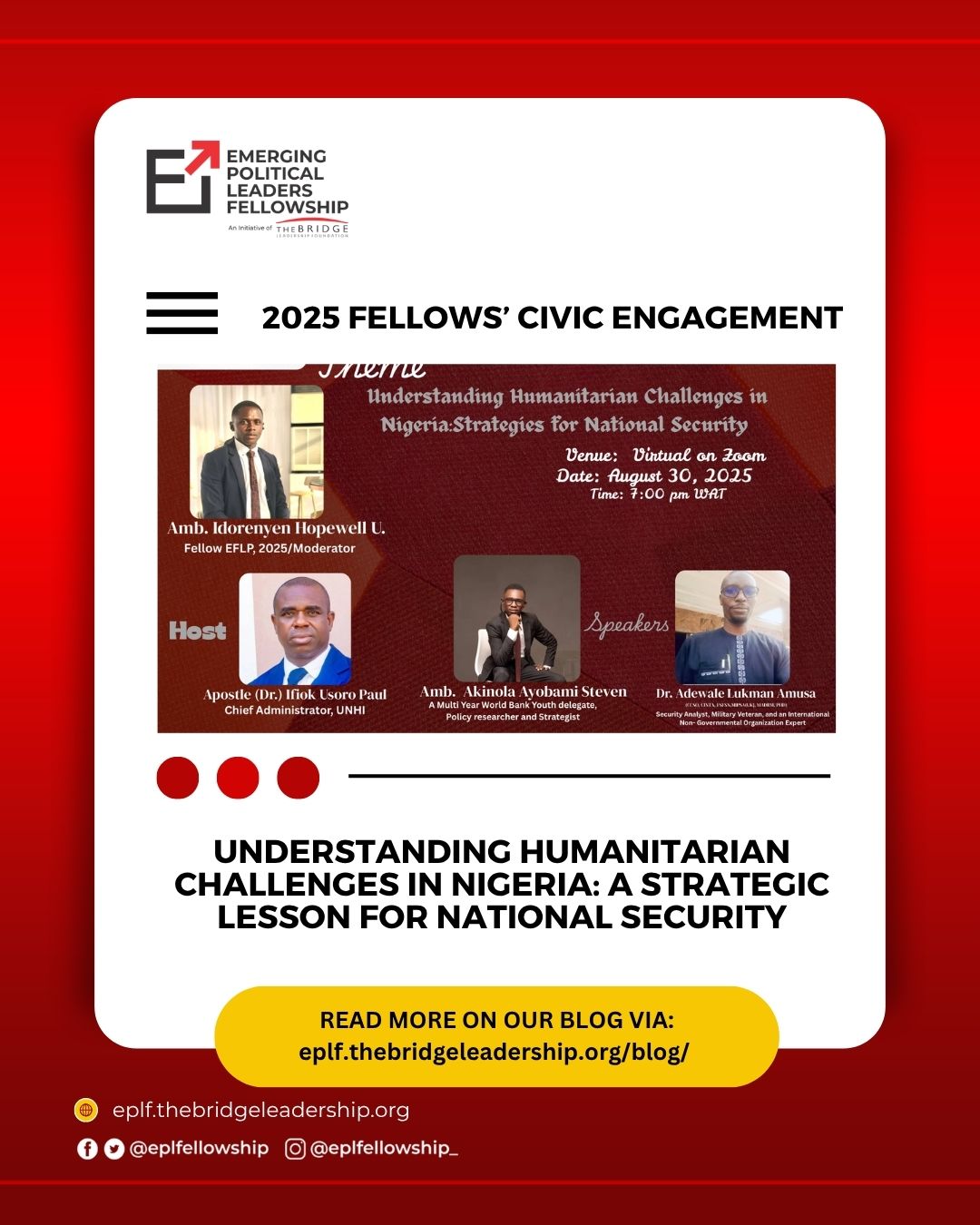By Idorenyen Hopewell Ukpai, 2025 EPLF Fellow
On the 30th of August 2025, Idorenyen Hopewell Ukpai, a fellow of the Emerging Political Leaders Fellowship (EPLF), hosted a Civic Engagement project that carried both urgency and depth. Titled “Understanding Humanitarian Challenges in Nigeria: A Strategic Lesson for National Security,” the activity was convened virtually via Zoom and brought together 20 participants. Among them were international humanitarian experts, civil society practitioners, and an academic and Policy Researcher from the Nigerian Institute of International Affairs (NIIA).
The purpose was clear: to explore Nigeria’s pressing humanitarian challenges, educate participants on their ripple effects across communities and governance, and provoke deeper reflection on the role of service, accountability, and security in building a resilient nation.
The Experience
The session, hosted through Unison Humanitarian Initiatives in Lagos, was not without its challenges. Technical hitches and an initially low turnout of only seven participants tested the commitment of the organizing team. However, as the event progressed, the atmosphere shifted. More participants joined, the discussions deepened, and the energy in the room became one of urgency and resolve.
Amb. Prof. Nathan Luga, President of the initiative, opened the dialogue with a strong message: humanitarian service is more than charity, it is a safeguard for national stability. This powerful reminder set the tone for the keynote address delivered by Akinola Ayobami, who dissected the complex landscape of Nigeria’s humanitarian crises.
He painted a sobering picture: corruption within relief systems, escalating food insecurity projected to affect 33 million Nigerians in 2025, climate-induced displacement, persistent healthcare deficiencies, herder–farmer clashes, and terrorism. Each of these challenges, he emphasized, is deeply intertwined with national security, community cohesion, and the trust citizens place in their government.
Participants actively engaged with these insights, sharing personal stories of community struggles and asking how humanitarian organizations can serve both as advocates and as first responders. These exchanges drove home a crucial truth: humanitarian issues are not distant crises reserved for news headlines. They are local, immediate, and deeply personal realities that touch the lives of ordinary Nigerians every day.
Key Outcomes
The activity achieved several important outcomes. For many participants, it was their first time navigating Zoom. This in itself became a lesson in digital empowerment, showing how online platforms can foster inclusivity and cross-border collaboration.
Beyond digital literacy, participants left with a sharper awareness of how humanitarian issues, whether hunger, displacement, or healthcare gaps, are directly connected to national peace and security. They began to see the humanitarian sector not simply as charity but as a vital arm of governance and national resilience.
Another key outcome was the emergence of a shared commitment. Participants resolved to become advocates within their own communities, to carry forward the culture of service, and to view the protection of critical national infrastructure as part of their civic responsibility. Finally, the dialogue succeeded in elevating humanitarian challenges as national security priorities, reinforcing the truth that failure in one region can destabilize the entire country.
Lessons Learnt
Several lessons emerged from this engagement. First, humanitarian issues are not regional problems, they are national concerns. Hunger, terrorism, or displacement in one area will eventually ripple across borders and affect the entire nation.
Second, integrity and accountability are essential in humanitarian work. Corruption within the sector undermines trust and reduces the effectiveness of interventions. Participants emphasized that transparent systems must be established to safeguard both resources and the communities they serve.
Third, education remains non-negotiable. Sustainable development depends on communities that are informed, empowered, and able to act decisively. Similarly, early warning systems save lives by giving communities timely access to information that can help them prepare for and mitigate crises.
Finally, the fellowship underscored the humanitarian mandate of selflessness. True service requires placing the needs of others above personal gain, a principle that must guide both individuals and institutions working in this field.
Recommendations
Looking ahead, several recommendations emerged from the discussions. Individuals should be encouraged to join or partner with humanitarian organizations, thereby expanding the collective capacity to save lives and respond to crises. Strategic collaboration with state and federal agencies must also be strengthened to reduce overreliance on government responses, which are often delayed or insufficient.
Equally important is the need to institute strict accountability mechanisms that promote transparency within humanitarian services. Policies on national security must also be kept above politics, ensuring that the safety of citizens is not compromised by partisan interests. Finally, participants stressed the need to integrate more youth into governance and civic processes, as their energy and innovation can significantly strengthen humanitarian responsiveness.
Next Steps
The session was not an endpoint but the beginning of a longer journey. With the endorsement of the president of Unison Humanitarian Initiatives, I am committed to continuing civic engagements that promote effective humanitarian practices. Immediate next steps include proposing partnerships with local, state, and federal units to improve humanitarian service delivery, as well as building alliances with non-partisan organizations and civil society groups to push for youth participation in governance and humanitarian causes.
A policy brief will also be developed from the insights shared during the webinar, providing a roadmap for advocacy and engagement with relevant stakeholders. In addition, preparations are already underway for a follow-up event scheduled for October 13, 2025, to commemorate the International Day for Risk Reduction.
Conclusion
This civic engagement activity reaffirmed a powerful truth: humanitarian service is national service. To secure Nigeria’s future, we must look beyond infrastructure and politics and focus on the human lives most affected by the crisis. The voices of experts, the determination of participants, and the lessons distilled from this dialogue serve as a reminder that humanitarianism is not charity, it is strategy.
With consistent effort, inclusive participation, and uncompromising accountability, Nigeria can transform its humanitarian challenges into opportunities for resilience, peace, and strengthened national security.

